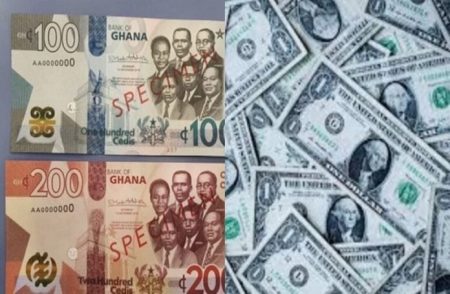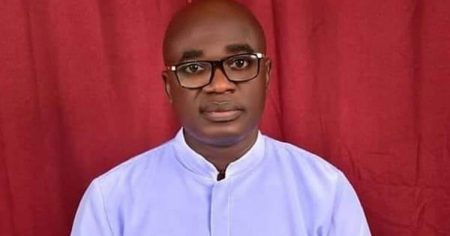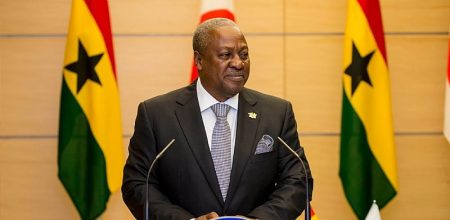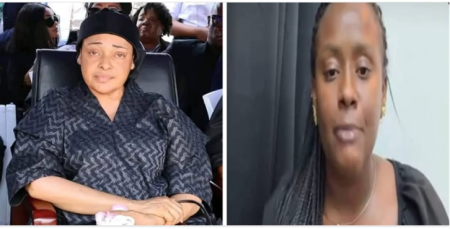This case revolves around two women, Priscilla Duah Birago and Charity Dede Tetteh, who are facing charges related to offensive statements they made against President John Dramani Mahama of Ghana. The incident occurred on August 6, 2025, the same day as a helicopter crash, and involved the women expressing their wish that the President had been a victim of the crash and subsequently consumed by dwarfs. Their statements, broadcasted live on the social media platform TikTok, were deemed offensive and abusive, leading to their arrest and subsequent court appearances.
The women, a 29-year-old National Service Person and a 29-year-old beautician respectively, have pleaded not guilty to the charges of conspiracy to commit a crime, specifically offensive conduct and offensive conduct to the breach of peace. Their defense counsel argued for their release on bail, emphasizing that they had already spent time in custody, learned from their actions, and posed no threat to the ongoing investigation as their mobile phones were already in police possession. The prosecution, however, opposed bail, citing the ongoing nature of the investigation and their pending application to the High Court for access to the accused’s phones to extract the incriminating video evidence.
The court, presided over by Mrs. Angela Attachie, ultimately decided to remand the two women into custody, scheduling their next appearance for September 4, 2025. The prosecution’s case rests on the live-streamed video where the offensive statements were made, specifically mentioning Charity’s TikTok account name “Abena Birago” as the platform for dissemination. The police obtained a forensic capture of the live stream as evidence. The women’s emotional distress, characterized by uncontrollable weeping both inside and outside the courtroom, underscores the gravity of the situation they face.
This case raises several important points for discussion. First, it highlights the increasing use of social media platforms like TikTok as avenues for political expression, which can sometimes cross the line into offensive and potentially criminal behavior. The immediacy and reach of these platforms amplify the impact of such statements, potentially inciting public unrest or causing harm to individuals’ reputations. The legal implications of online speech are becoming increasingly relevant as societies grapple with balancing freedom of expression with the need to protect individuals and maintain public order.
Second, the case underscores the potential consequences of making offensive and abusive statements against public figures, particularly those holding high office. While freedom of speech is a fundamental right, it is not absolute and can be restricted when it infringes on the rights and safety of others. Laws against defamation, incitement to violence, and threats exist to safeguard these boundaries. This case will likely test the application of these laws in the context of online speech and political commentary.
Finally, the case brings to light the challenges faced by legal systems in adapting to the rapidly evolving landscape of digital communication. Extracting evidence from mobile phones and social media platforms requires specialized expertise and legal frameworks. The prosecution’s need to apply to the High Court for access to the phones highlights the complexities involved in gathering digital evidence while respecting individuals’ privacy rights. As technology continues to advance, the legal system must evolve to effectively address the challenges posed by digital evidence and online speech.
The emotional response of the accused women, weeping uncontrollably, adds a human dimension to the legal proceedings. While their emotional distress does not negate the potential legal ramifications of their actions, it underscores the personal toll of facing criminal charges and the public scrutiny that accompanies such cases. The court’s decision to remand them in custody, despite their lawyer’s plea for bail, suggests a serious consideration of the gravity of the alleged offense and the need to ensure a thorough investigation.
The two-day remand period granted by the court serves multiple purposes. It allows the police to continue their investigation, including the critical step of accessing and analyzing the content of the accused women’s mobile phones. It also provides time for the prosecution to solidify their case and for the defense to prepare their strategy. While the accused are held in custody during this period, it represents a relatively short timeframe in the overall legal process.
The reference to “dwarfs” in the alleged statement adds a layer of cultural sensitivity to the case. In some cultures, the term “dwarf” carries negative connotations and can be considered derogatory. The use of this term in the context of the offensive statement could be interpreted as adding to the gravity of the insult against the President. The court will likely consider the cultural context of the statement when assessing the severity of the offense.
This case will undoubtedly be closely watched by the public and legal experts alike, as it touches upon critical issues of freedom of expression, the use of social media in political discourse, and the evolving legal landscape surrounding online speech. The outcome of this case will likely set a precedent for future cases involving similar online offenses, shaping how online speech is regulated and the consequences for those who cross the line into offensive and abusive territory.














